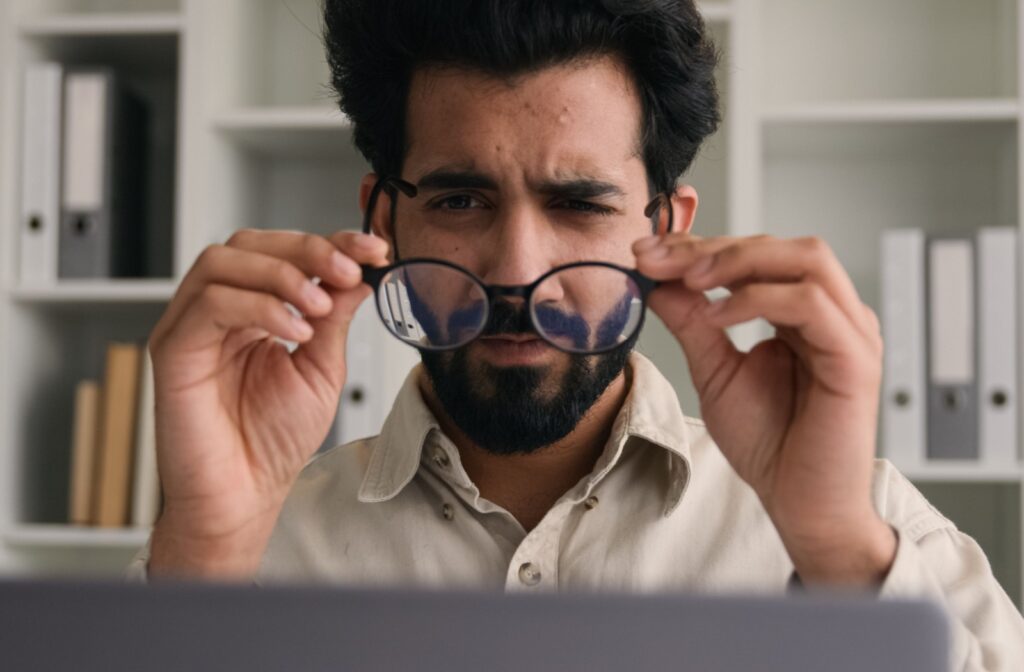So you’ve just been told you’re myopic. Should you keep your glasses on all day or just for specific tasks? And what happens if you don’t wear them at all?
Depending on how severe your myopia is and what your daily routine looks like, you may need to wear your glasses all the time. Factors like eye strain, driving needs, and screen time can all influence how often glasses should be worn.
Learning why glasses are prescribed for nearsightedness, when you should wear them, and the potential risks of improper use can help you determine what’s right for you.
What Is Myopia?
Myopia (nearsightedness) is a refractive error that causes distant objects to appear blurry while nearby objects remain clear. It occurs when the shape of the eye causes light to focus in front of the retina, rather than directly on it.
Symptoms of nearsightedness can include:
- Difficulty reading road signs or watching TV from across the room
- Frequent squinting to see distant objects more clearly
- Eye strain or headaches, especially after trying to focus on something far away
- Reduced performance in distance-based activities, such as driving or sports
If you or your child is experiencing these symptoms, an eye exam can help confirm whether glasses or contact lenses are needed for vision correction.
Do You Need to Wear Glasses All the Time If You’re Nearsighted?
The necessity of wearing glasses throughout the day depends on the severity of your nearsightedness and your lifestyle. Here’s a breakdown of some potential scenarios:
Mild Nearsightedness
If your myopia is mild, you may only need to wear glasses for specific tasks like driving, attending lectures, or watching a movie. During activities where clear distance vision isn’t essential (e.g., reading, writing, or using a computer), you may not need your glasses.
Moderate to Severe Nearsightedness
If you have moderate to severe myopia, glasses are generally more of a full-time necessity. Without wearing them, you may struggle to perform daily tasks effectively, such as recognizing faces, navigating unfamiliar places, or driving safely.
Children & Teenagers
For kids and teens, wearing glasses consistently is recommended for proper vision development. Untreated or improperly corrected nearsightedness during youth can lead to worsening vision over time.
If you’re unsure about your or your loved ones’ specific needs, consulting an eye care professional can help determine the plan for you.
What Happens If You Don’t Wear Glasses?
Some people avoid wearing their glasses under the misconception that their condition might worsen with use—it doesn’t. On the contrary, not wearing your glasses doesn’t harm your eyes permanently, but it can cause discomfort and difficulty.
Here’s what can happen if you skip wearing your corrective lenses:
- Eye strain and fatigue: Attempting to focus on blurry objects puts extra stress on your eyes, leading to discomfort and headaches.
- Reduced efficiency: You may find it harder to concentrate and complete tasks that require clear vision, such as driving or reading distant text.
- Safety concerns: For activities like driving, failing to wear glasses could put you and others at risk.
Ultimately, wearing your glasses helps you or your child to go about their day with improved clarity and safety.

Glasses vs. Contact Lenses for Nearsightedness
While glasses are a popular and convenient choice for vision correction, contact lenses are another option. Each has its benefits:
- Glasses are comfortable, less invasive, and lower maintenance. They also offer protection from dust and debris.
- Contact lenses can provide a more natural field of vision and are ideal for activities like sports and exercise.
Myopia Control Options
Myopia control is an important part of modern eye care, especially for children and teens whose vision is still developing. Rather than simply correcting blurry distance vision with glasses or contacts, myopia control focuses on slowing the progression of nearsightedness over time.
At Total Vision Del Mar, we offer a variety of personalized myopia management options depending on your child’s specific needs. These include:
- Orthokeratology (ortho-k) lenses: Specially designed contact lenses worn overnight to gently reshape the cornea, providing clear vision during the day without the need for glasses or daytime contacts.
- MiSight® 1 day lenses: Daily disposable soft contact lenses that have been clinically proven to slow myopia progression in children.
- Low-dose atropine eye drops: A medicated drop used at bedtime to help reduce the eye’s tendency to elongate, which is a key factor in the progression of myopia.
We work closely with families to help them understand how myopia affects vision and what proactive steps can be taken to protect their child’s long-term eye health. Early intervention can make a significant difference in reducing the risk of high myopia and its associated complications later in life.
The Role of Eyestrain & Digital Devices
Spending long hours in front of screens can exacerbate symptoms of eye strain, especially for those with myopia and other vision issues. Digital eye strain, also called computer vision syndrome, is a growing concern in today’s digital age.
If you often use laptops, smartphones, or tablets, consider these tips:
- Follow the 20-20-20 Rule: Every 20 minutes, look at something 20 feet away for at least 20 seconds.
- Adjust screen brightness to match your surroundings.
- Take regular breaks to relax your eyes.
For personalized advice on managing digital eye strain, we provide specialized services to protect your vision.
Make the Most of Your Vision with Total Vision Del Mar
Deciding when and how to wear your glasses for myopia shouldn’t be confusing. Whether you’re experiencing eye strain or want to see distant objects clearly, finding the right prescription is the first step.Take the first step to healthier eyes and clearer vision by booking an appointment with Total Vision Del Mar. Our team is here to help with advice and personalized solutions.



